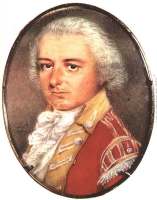


| [ Previous ] [ Next ] |

|

|
Son of the colonial governor of Newfoundland, Henry Clinton first distinguished himself in Europe as a soldier during the French and Indian Wars. He arrived back in the colonies in 1775 aboard the Cerberus, in time to take part in Bunker/Breed's Hill, and commanded the first unsuccessful expedition against Charleston. He assumed the top command position for the British army after Sir William Howe's resignation in 1778, tried to resign a couple of times himself (due to a lack of practical support from London), but remained in his unenviable position until after the surrender at Yorktown.
Sir Henry was his own worst enemy. On a theoretical level, he was a talented and clever strategist, and he could have proved a valuable second-in-command to the right general. But as soon as he gained the top spot himself, his insecurities crippled him.
Reports on Clinton's character and behavior suggest an unstable man, possibly chronically depressed, possibly paranoid. He kept essentially every scrap of paper that crossed his desk including dinner receipts, which makes his personal papers a treasure trove for historians. His inability to trust Lord Cornwallis (whom he thought was after his job) led to difficulties within the command structure. They kept their feud relatively private until after the war, when they indulged in a round of mutual sniping and finger-pointing that played out in the London newspapers and gossip columns and continued until Clinton's death. (One of Cornwallis's greatest -- and most justified -- complaints was that Clinton failed to support him at Yorktown.)
Unlike his rival, Cornwallis -- who went on to bigger and better things -- Sir Henry's failure as commander in chief led to his being largely ostracized and forgotten after the war. Although he served in Parliament, he remained without a posting until nearly the end of his life. In July 1794, he was appointed Governor of Gibraltar, but by then his health had started to fail. He was forced to postpone leaving England several times due to illness. Eventually, Charles O'Hara went out in his place, to hold the fort as Deputy Governor until Sir Henry regained his strength. Unfortunately, he never did recover. In December, 1795, he had minor surgery for an abscess on his knee and died a few days later, on December 23, at Portland Place, his London home near Regent's Park.1
As an aside, at least half of the sources which mention his death say that he died at Gibraltar rather than in England. This error was probably introduced into history by his entry in the Dictionary of National Biography, which states that "...in July 1794 he became governor of Gibraltar. He died at that post on 23 Dec. 1795." However, notice of his death appeared in The Times on December 26, 1795, and the War Office announced O'Hara's promotion to Governor in his stead the same date. It would be impossible for the news to have reached England so quickly, if he had died at Gibraltar.2
Ban Tarleton entered Clinton's command structure as a volunteer with the 16th Light Dragoons. In the summer of 1778, Clinton ordered the formation of the British Legion as a mixed regiment of horse and infantry. Lord William Schaw Cathcart, Clinton's adjutant general, was named its commander. Ban was promoted to lieutenant colonel and assigned as its second in command and field commander, a position he held until the end of the war. Tarleton and the Legion traveled south with Clinton in 1780, and remained behind under Cornwallis's command following the surrender of Charleston.
| [ Index ] | [ Previous ] [ Next ] |
1 William B. Willcox, Portrait of a General: Sir Henry Clinton and the War of Independence (New York: Alfred A Knopf, 1964), p488-9 [ back ]
2 Sir Leslie Stephen and Sir Sidney Lee, ed., The Dictionary of National Biography, 22 vols. (Oxford: Oxford University Press, 1882), 4:550 [ back ]
| Return to the Main Page | Last updated by the Webmaster on January 30, 2004 |